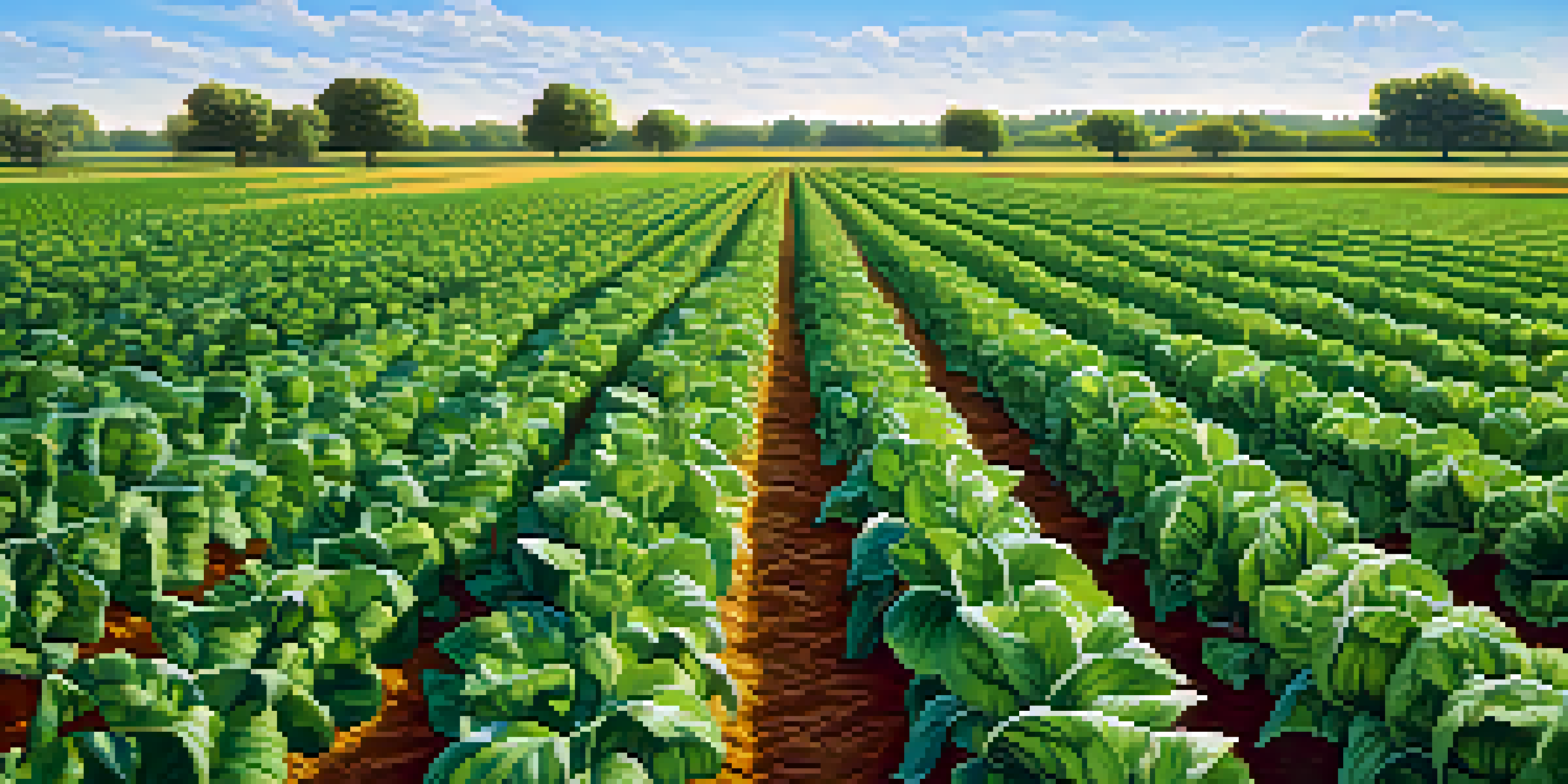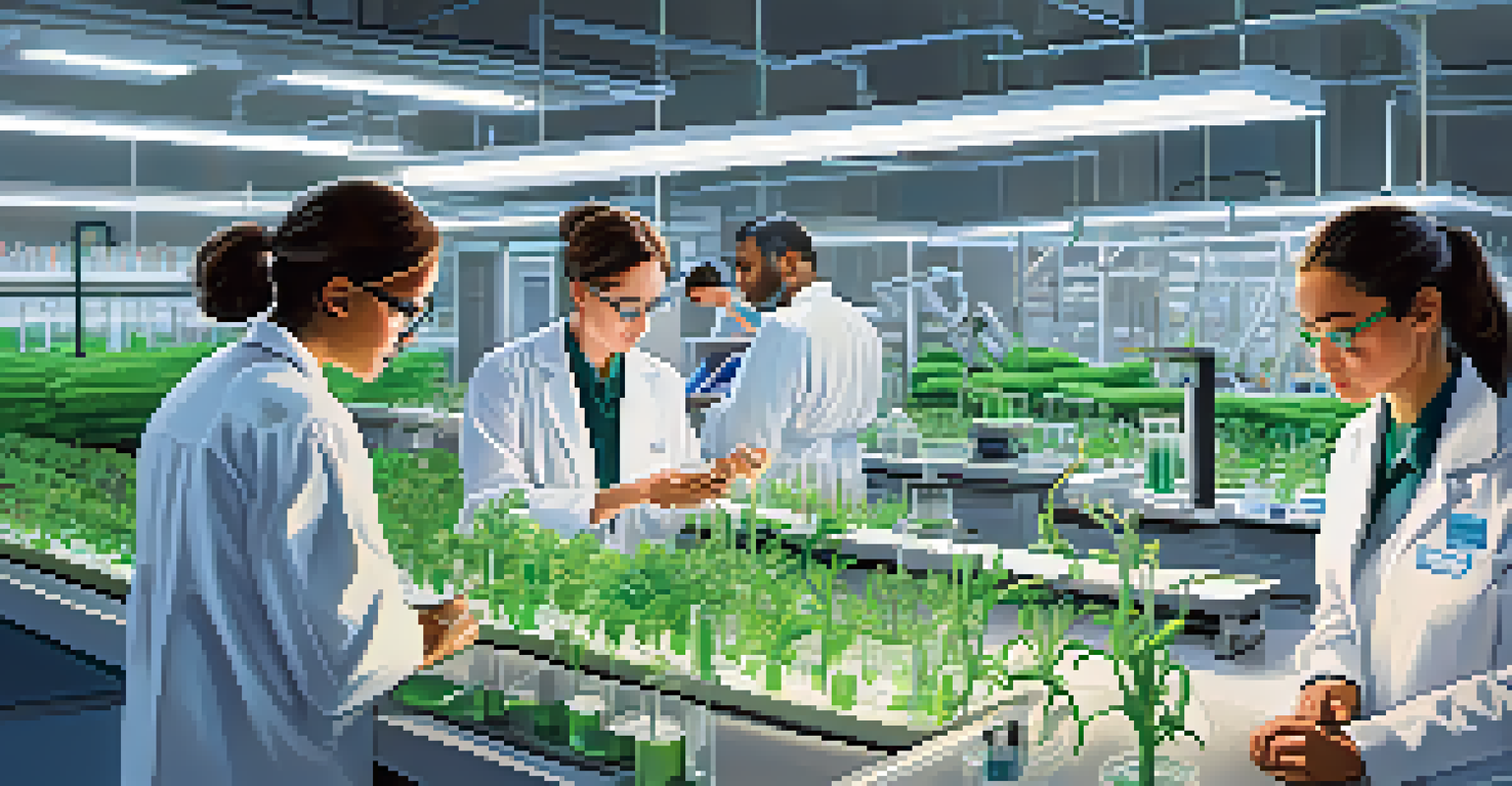Plant Biotechnology: Techniques for Enhancing Crop Genetics

Understanding Plant Biotechnology and Its Importance
Plant biotechnology refers to the use of scientific tools and techniques to manipulate plant genes for desired traits. This field is crucial for improving crop yield, disease resistance, and environmental sustainability. With the global population on the rise, enhancing food production through biotechnology has become more important than ever.
Biotechnology is the use of living systems and organisms to develop or make products. It is a way to harness nature's own tools to create innovative solutions to some of the world's greatest challenges.
By utilizing biotechnological methods, scientists can introduce new traits into plants that may not be possible through traditional breeding. This innovation helps address challenges such as climate change, pests, and limited arable land. In essence, plant biotechnology plays a key role in securing food for future generations.
As we delve deeper into plant biotechnology, it’s essential to understand the various techniques employed to enhance crop genetics. Each technique presents unique advantages and applications, making it a diverse and dynamic field.
Genetic Engineering: The Heart of Crop Modification
Genetic engineering involves directly altering the DNA of a plant to achieve specific traits. This process can involve inserting, deleting, or modifying genes, allowing for precise control over plant characteristics. For example, scientists can create crops that resist pests or tolerate harsh environmental conditions.

One of the most well-known methods of genetic engineering is the use of Agrobacterium tumefaciens, a bacterium that can transfer DNA to plants. This natural process has been harnessed to create genetically modified organisms (GMOs) that offer significant benefits. However, the use of GMOs does raise questions about safety and ethics that require thoughtful consideration.
Biotech Enhances Crop Resilience
Plant biotechnology is essential for improving crop yield and disease resistance, crucial for feeding a growing global population.
Ultimately, genetic engineering is a powerful tool in plant biotechnology. It allows for rapid advancements in crop genetics, ensuring that our agricultural systems can adapt to the changing needs of society.
Marker-Assisted Selection: Speeding Up Breeding
Marker-assisted selection (MAS) is a technique that uses molecular markers to identify desirable traits in plants. By analyzing specific genes associated with traits like drought resistance or high yield, breeders can select plants that are more likely to produce those traits. This approach significantly speeds up the breeding process compared to traditional methods.
The greatest threat to our planet is the belief that someone else will save it.
For instance, if a breeder is looking to develop a drought-resistant variety of wheat, they can use MAS to quickly identify and select plants that carry the desired genetic markers. This saves time and resources, making the breeding program more efficient. With climate change posing a threat to agriculture, MAS provides a valuable tool for developing resilient crops.
Overall, marker-assisted selection exemplifies how biotechnology can enhance traditional breeding practices. By integrating modern technology with established methods, we can create crops that meet the demands of an evolving agricultural landscape.
CRISPR Technology: A New Frontier in Crop Genetics
CRISPR technology has revolutionized the field of genetics, and its applications in plant biotechnology are groundbreaking. CRISPR allows scientists to make precise edits to the genome of a plant, such as adding, removing, or altering specific genes. This technique offers unprecedented accuracy and efficiency in crop improvement.
One compelling example of CRISPR in action is the development of disease-resistant rice varieties. By editing genes that make rice susceptible to certain pathogens, researchers can create crops that thrive even in challenging conditions. This not only enhances food security but also reduces the need for chemical pesticides.
CRISPR Revolutionizes Genetics
CRISPR technology allows precise genome editing in plants, leading to the development of crops that can withstand diseases and environmental stresses.
As CRISPR technology continues to evolve, its potential applications in agriculture are vast. It opens up new possibilities for creating crops that can withstand environmental stresses, ultimately leading to sustainable farming practices.
Tissue Culture: Growing Plants from Cells
Tissue culture is a technique that involves growing plants from cells or tissues in a controlled environment. This method enables the rapid propagation of plants, ensuring that desirable traits are preserved. It’s particularly useful for cloning plants that have exceptional qualities, such as high yield or disease resistance.
For example, when a farmer wants to replicate a high-yielding hybrid variety of tomato, tissue culture allows for the production of numerous identical plants. This not only saves time but also ensures uniformity in crop quality. Tissue culture can also help in the conservation of endangered plant species by creating genetically identical individuals.
In essence, tissue culture embodies the blend of art and science in plant biotechnology. It showcases how innovative techniques can lead to enhanced crop production while preserving the genetic diversity of plants.
Synthetic Biology: Designing New Plant Traits
Synthetic biology is an emerging field that combines biology and engineering to design and construct new biological parts. In the context of plant biotechnology, synthetic biology allows scientists to create plants with entirely new traits that could not be achieved through traditional breeding or genetic modification alone. This innovative approach holds immense potential for transforming agriculture.
For instance, researchers can engineer plants to produce high-value compounds like pharmaceuticals or biofuels. This not only enhances the economic viability of crops but also contributes to sustainable practices by utilizing agricultural waste. The possibilities seem endless as synthetic biology continues to advance.
Ethics in Crop Biotechnology
The advancements in plant biotechnology raise important ethical questions about safety, environmental impact, and the socio-economic implications of genetically modified organisms.
As we explore the potential of synthetic biology, it becomes clear that it represents a significant step forward in enhancing crop genetics. This field challenges our understanding of what plants can do and how they can be engineered to meet human needs.
Ethical Considerations in Plant Biotechnology
While the advancements in plant biotechnology are exciting, they also come with ethical considerations that cannot be ignored. Questions about safety, environmental impact, and the socio-economic implications of genetically modified crops are at the forefront of public debate. Addressing these concerns is essential for building trust among consumers and stakeholders.
For example, the introduction of GMOs has led to discussions about biodiversity and the potential risks of monoculture. Farmers and scientists must carefully weigh the benefits of enhanced crop traits against the potential consequences for ecosystems and agricultural practices. Engaging the public in these discussions is vital for responsible innovation.

Ultimately, navigating the ethical landscape of plant biotechnology requires transparency and collaboration among scientists, policymakers, and the public. By fostering open dialogue, we can ensure that the benefits of plant biotechnology are realized while minimizing potential risks.
The Future of Plant Biotechnology and Global Food Security
As we look ahead, the future of plant biotechnology holds promise for addressing global food security challenges. With the ability to enhance crop genetics through various innovative techniques, we can develop resilient crops that thrive in the face of climate change and resource limitations. This adaptability is essential for feeding a growing population.
Moreover, as technology continues to evolve, the integration of biotechnology with sustainable agricultural practices will become increasingly important. This synergy can lead to more efficient resource use, reduced environmental impact, and improved livelihoods for farmers. By embracing these advancements, we can create a more sustainable and food-secure future.
In conclusion, plant biotechnology is not just about enhancing crop genetics; it’s about reshaping the future of agriculture. As we harness these techniques, we have the opportunity to build a resilient food system that can withstand the challenges of tomorrow.